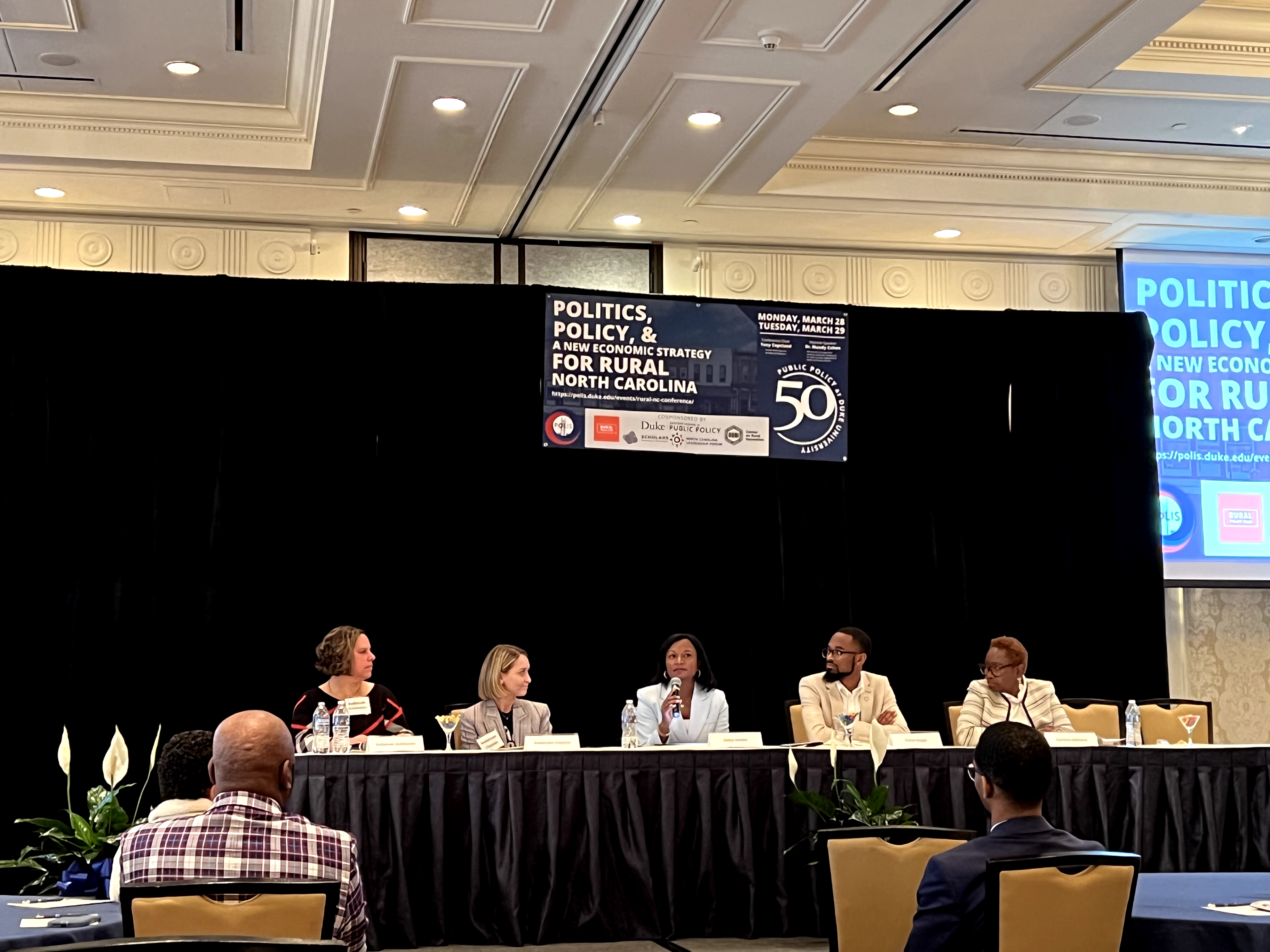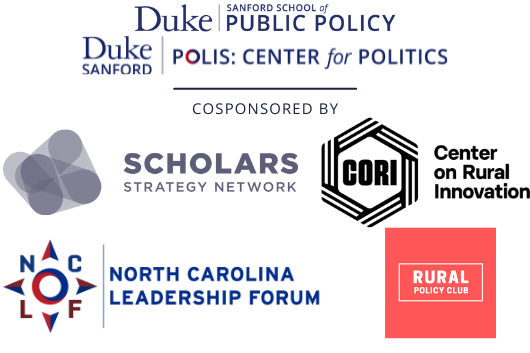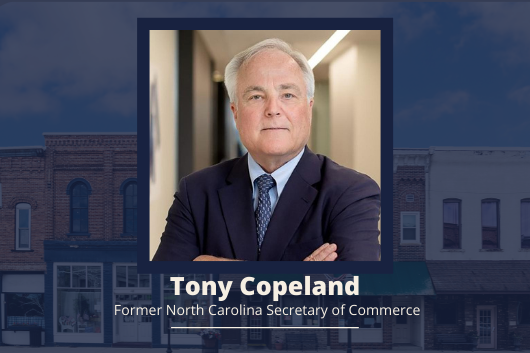Fostering economic development and revitalization in rural communities represents one of the most important challenges facing North Carolina and the nation. Scholars, practitioners, and advocates took stock of the current economic and political landscape, considered what a new economic strategy for rural North Carolina could look like, as well as the policy changes necessary to provide national leadership on rural economic renewal. Themes highlighted include rural identity, access to broadband, political organization and the local example of Wilson, North Carolina.
Politics, Policy, and a New Economic Strategy for Rural North Carolina
Monday, March 28 & Tuesday, March 29, 2022
Chair: The Honorable Tony Copeland, former North Carolina Secretary of Commerce
Keynote: Dr. Mandy Cohen, EVP and CEO of Aledade Care Solutions and former Secretary of the North Carolina Department of Health and Human Services
Day One: Monday, March 28
10:30-11:00 AM Registration
11:00-1:00 PM Welcome and Remarks from Conference Chair, Tony Copeland
Lunch will be provided
1:00-2:15 PM Session 1: Rural Communities Now: Exploring the Current Landscape
In this opening session, leading national experts and advocates went over what rural communities look like today, the challenges that they currently face, how the contemporary economic landscape/the new economy differs from those of the past, and how well our narratives regarding rural economic development fit the current landscape. The session also included a discussion of innovations that we’ve seen in rural economies that offer powerful examples for community development and revitalization. Moderated by Lindsey Haynes-Maslow, Associate Professor and Extension Specialist in the Department of Agricultural and Human Sciences at NC State University.
- Anita Brown-Graham, Gladys Hall Coates Distinguished Professor of Public Law and Government at UNC, Director, ncIMPACT Initiative
- Matt Dunne, Founder and Executive Director of the Center on Rural Innovation
- Merald Holloway, Founder of NC 100 and Partnership Manager, MDC Rural Forward
2:30-3:30 PM Keynote Address with Dr. Mandy Cohen, EVP and CEO of Aledade Care Solutions and former Secretary of the North Carolina Department of Health and Human Services
"Dr. Mandy Cohen offers prescriptions for lifting rural health at Duke event," NC Policy Watch
4:00-5:15 PM Session 2: Contrasts and Connections: Perspectives on Rural and Urban Communities
Panelists discussed trends in rural and urban economic development in recent decades and started by establishing what “rural” and “urban” currently means in North Carolina. Panelists paid particular attention to how economic opportunities have been unfolding in rural and urban communities, workforce development, and the role that new businesses play in shaping economic development, with a particular focus on providing opportunities for young residents. Moderated by Mac McCorkle, Professor of the Practice in the Sanford School of Public Policy.
- Kevin Austin, Chair of Yadkin County Commissioners and Former President of North Carolina Association of County Commissioners
- Linda Brown, President, Asheboro/Randolph Chamber of Commerce
- Patrick Woodie, President, NC Rural Center
Rural Recaps: Contrasts and Connections, Antonio Butler, MPP ’23
5:30-6:45 PM Session 3: Developing a New Economic Strategy: Lessons from the North Carolina Fund
Panelists discussed Terry Sanford’s North Carolina Fund, its innovative approach to addressing poverty in North Carolina and the model that it provided for national change, and the lessons that it provides policymakers working to address pressing issues in today’s politically charged policyscape. Moderated by Joel Fleishman, Professor of Law and Public Policy at Duke University, Director of the Center for Strategic Philanthropy and Civil Society and the Samuel and Ronnie Heyman Center.
- David Dodson, Former President and current Senior Fellow, MDC Inc.
- John Drescher, Contributing Editor, The Assembly
- Leoneda Inge, Race and Southern Culture Reporter for WUNC and Co-Host, "Tested" Podcast
- Robert Korstad, Emeritus Professor of Public Policy and History at Duke University
- James Leloudis, Professor of History at UNC Chapel Hill, Associate Dean for Honors, and Director of the James M. Johnston Center for Undergraduate Excellence
Day Two: Tuesday, March 29
8:30 - 9:00 AM Registration
Coffee & pastries will be provided
9:00 - 10:15 AM Session 4: Case Study: Spotlight on Wilson, North Carolina
Wilson, NC offers a powerful case study for successful investment in rural communities. In this discussion, panelists provided insight into Wilson’s journey and the revitalization efforts that have contributed to its being described as “the next innovation hub in North Carolina.” Moderated by Anderson Clayton, Broadband Analyst, Rural Innovation Strategies, Inc.
- Will Aycock, General Manager, Greenlight Community Broadband for the City of Wilson, NC
- Paula Benson, Executive Director, Wilson Forward
- Jennifer Lantz, Executive Director, Wilson Economic Development Council
- Rodger Lentz, Chief Planning and Development Officer, City of Wilson
10:30 - 11:45 AM Session 5: Vital Infrastructure and Broadband Access
This panel focused on the infrastructure necessary for economic development, offering an assessment of existing infrastructure and considering the kinds of infrastructural developments that are necessary to promote thriving rural communities. The discussion paid particular attention to broadband access and its significance for a new economic strategy for North Carolina. Moderated by Dr. Sarah Verbiest, Executive Director of the UNC Center for Maternal and Infant Health and Director of the Jordan Institute for Families at UNC School of Social Work
- Nate Denny, Deputy Secretary for Broadband & Digital Equity, NC Department of Information Technology
- Alex Kelley, Head of Broadband Consulting, Rural Innovation Strategies
- Jane Smith Patterson, President, Jane Patterson & Associates and Partner, Broadband Catalysts
- Marcus Trathen, Partner, Brooks Pierce
- Christa Wagner Vinson, Program Officer, Rural (Broadband & Infrastructure), Local Initiatives Support Corporation
11:45 - 1:00 PM Lunch Break
Lunch will be provided
1:00 - 2:15 PM Session 6: Rural Communities and the Politics of Identity
Panelists discussed diversity in rural communities considering issues like the social constructions of rural communities and how social and political portrayals of these communities compare with reality. The discussion paid particular attention to the experiences of diverse populations that call rural communities home. Moderated by Abdullah Antepli, Associate Professor of the Practice, Sanford School of Public Policy and Associate Professor of the Practice of Interfaith Relations at Divinity School.
- Danny Ellis, Pastor, college professor, executive director, and president of Ellis Research and Consulting Service, LLC
- Rep. James Gailliard, North Carolina State Representative
- Mavis Hill, Executive Director, Tyrrell County CDC
- Jay Pearson, Associate Professor in the Sanford School of Public Policy and Global Health, Faculty Research Scholar of DuPRI’s Population Research Center, and Associate of the Duke Initiative for Science & Society
- Jaquell Sneed-Adams, Master of Public Policy Candidate ’23, Duke University
- Sen. Mike Woodard, North Carolina State Senator
Rural Recaps: The Politics of Rural Identity, Antonio Butler, MPP ’23
2:30 - 3:45 PM Session 7: Political Organization in Rural Communities
Panelists discussed the democracy work that is taking place in rural communities, including the efforts of political parties, campaigns, and other organizations that aim to mobilize residents of rural communities for political engagement. Moderated by Deborah Goldstein, Executive Director, North Carolina Leadership Forum.
- Anderson Clayton, Chair of Person County, NC Democrats
- Aimy Steele, Founder & Executive Director, New North Carolina Project
- Chris Suggs, City Councilmember, City of Kinston and Founder, Kinston Teens, Inc.
- Cynthia Wallace, Co-Founder, New Rural Project
Rural Recaps: Political Organization, Hana Stepnick ’23

The Sanford School of Public Policy and Polis: Center for Politics also thank the following co-sponsors:
Center on Rural Innovation
Duke Rural Policy Club
North Carolina Leadership Forum
North Carolina Scholars Strategy Network







